
by: SEO Strategist
Ashot Nanayan
Ashot Nanayan is the CEO and Founder of DWI and a seasoned SEO strategist. With a proven track record of...
All Articles by Ashot Nanayan
June 30, 2025
10 min. read
Starting from 2024, I noticed that the demand for “AI-powered SEO services” was growing fast, but I didn’t expect that by 2025, the search volume would almost double.
Like everything in life, AI SEO services have their downsides. First, many clients assume automation does all the work, so they no longer need SEO experts, or think they can pay ten times less. Then there’s the other group: the ones who push their in-house teams or agencies to rely too much on AI, which leads to low-quality content, keyword stuffing, and automated link-building. That’s exactly how many of them got penalized.
In this guide, I’ll walk you through the top AI-powered SEO tasks and share my personal take on each, including how useful AI is for the job (expressed as a percentage), and whether it’s worth using over a human-led approach.
I’ll also share examples from my own experience that helped me stay competitive in this industry. Ready? Let’s dive in.
Every founder or CEO I’ve ever worked with has one thing in common: they want to skip the grunt work and get to the strategy faster (I don’t blame them, frankly). No one wants to spend two weeks manually building a keyword foundation, especially when AI tools now promise to do it within minutes.
That’s why more and more companies are reaching out to SEO agencies asking for “AI-powered keyword research services” as if it’s some kind of magic solution.
But you should know when it makes sense to use AI for keyword research, and when it’s better to stay away.
AI doesn’t understand business context the way a strategist does. It doesn’t know that some of those “easy win” keywords have zero real buying intent. Or that the KD scores it’s referencing are often taken from outdated APIs or calculated using made-up formulas.
That said, I’m not against using AI for keyword research; I use it myself. But you have to know when and how to bring it in.
Now, let’s see when you should and should not use AI:
For example, when I tried using Surfer SEO to find secondary keywords for a blog post like ‘B2B SEO‘, it suggested dozens of unrelated keywords that just don’t make any sense.”
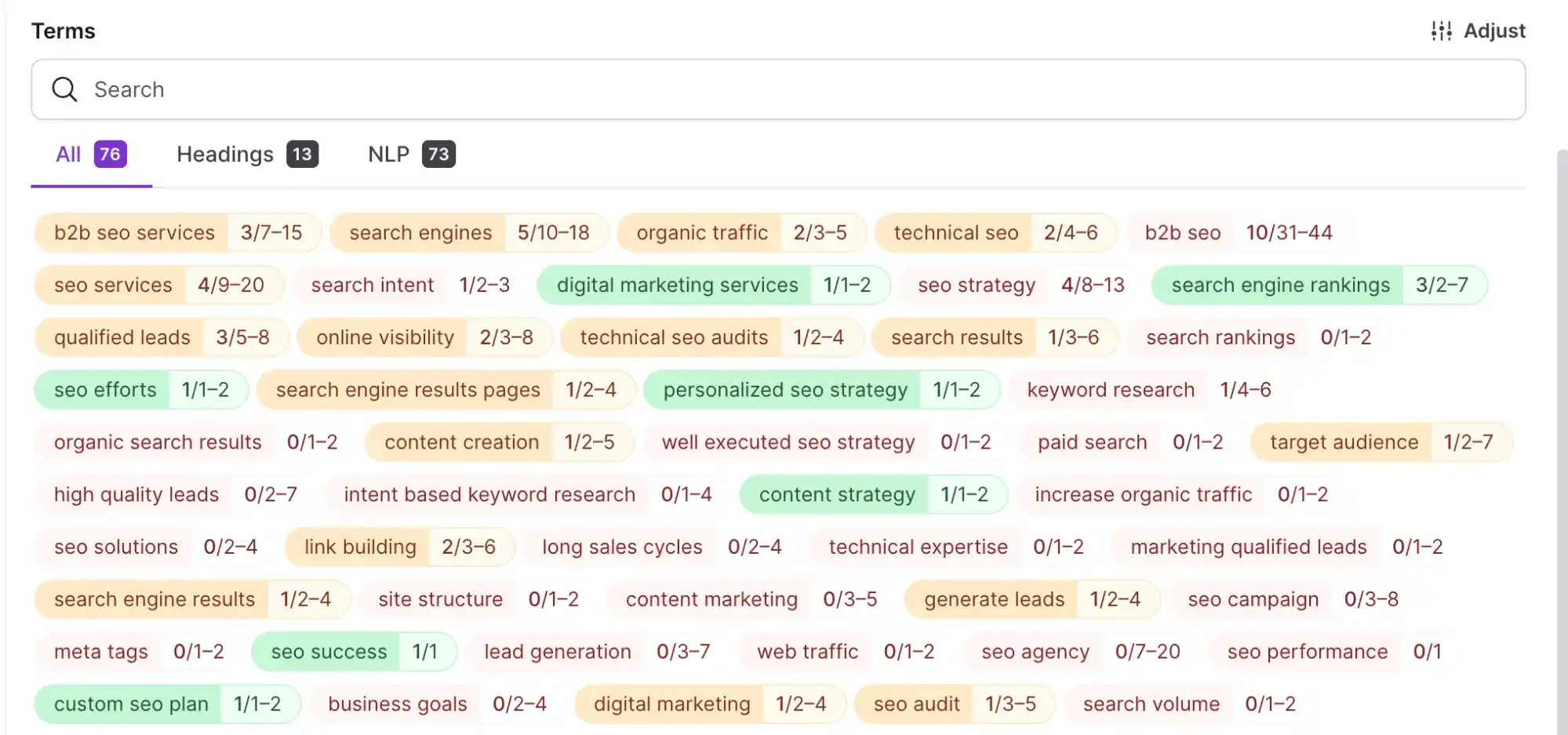
Even if you trust Ahrefs to sort keywords by intent, you’ll still find many that don’t match what you were looking for.
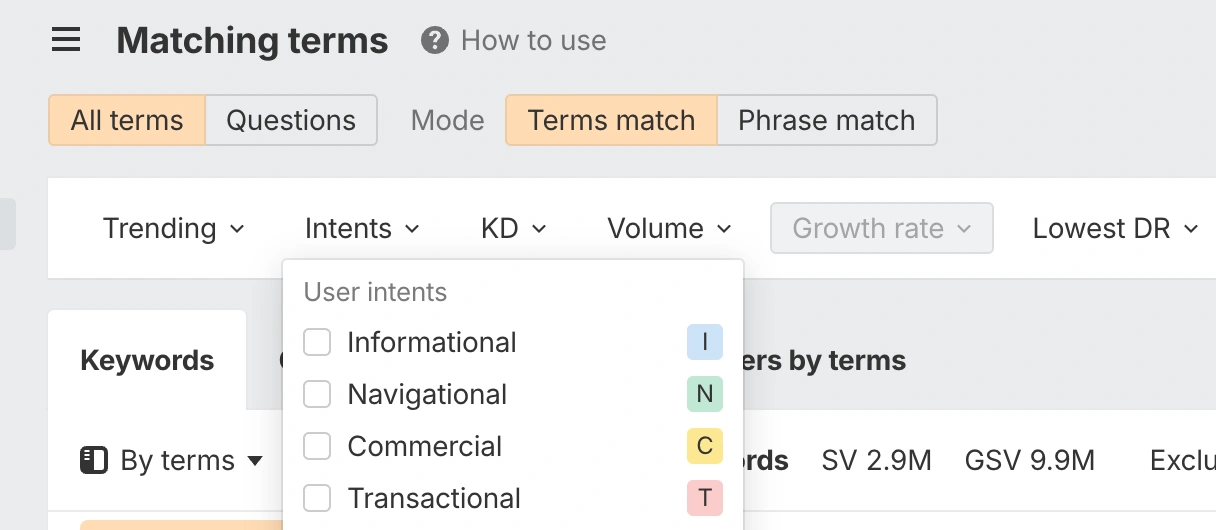
There are also other SEO tools for AI keyword research, such as Frase, to extract keyword and topic ideas from SERPs or identify questions people ask, keyword gaps, and intent-based opportunities.
So, when you hire an SEO agency to accelerate your keyword research process with AI, make sure they use it to speed things up, not rely on it entirely. Those are two completely different things, but it’s worth it if you know your craft.
Of course, we also offer keyword research services, and yeah, our team definitely knows how to use AI in our day-to-day work. So, here are a few ways we do it right.
For instance, when we’re dealing with thousands of keywords from Ahrefs or Semrush, we feed that raw list into Claude.ai (or DeepSeek) with clear instructions:
Then, with Google Sheets connected via API or CSV export, we let the model populate tags, assign content angles, and even suggest a primary keyword per group.
Here is another case: instead of relying on one-size-fits-all metrics like keyword difficulty, we define our own weighted logic:
We feed that data into Claude.ai via Sheets (or CSV) and instruct it to score and prioritize each keyword based on those weighted inputs. The model highlights what’s realistically attainable for our client right now, not just what looks juicy on paper.
Finally ( Yes, I am very greedy, haha), we use DeepSeek to review and summarize SERP content types across hundreds of keywords. With prompts like:
This gives us an edge. We can tell, for example, if a keyword is dominated by marketplaces or if editorial blogs have a chance. Instead of guessing based on KD, we use real SERP behavior patterns, extracted and summarized at scale using AI.
I believe automated reporting shouldn’t just “look pretty.” It should save hours, reveal actionable trends, and make it easier to spot wins and issues before they spiral.
While I’m not into fully automating keyword research, I’m totally fine with using AI for SEO reporting. So, if you’re looking for AI SEO services, first of all, make sure your SEO partner uses the right tools and techniques:
Definitely, not all automated SEO reporting tools are created equal. Here’s how we break it down:
| Tool | Best For | Pros | Cons |
|---|---|---|---|
| Looker Studio (formerly Data Studio) | Full-funnel SEO dashboards | 100% customizable, free, connects to GA4, GSC, BigQuery, etc. | Needs setup time, long learning curve without templates |
| AgencyAnalytics | White-labeled client dashboards | Clean UI, plug-and-play integrations (Ahrefs, GSC, GA, etc.), recurring email reports | Less flexible, expensive with add-ons |
| Google Sheets + API + GPT | Custom insights & anomaly detection | Fully flexible, scalable, easily paired with AI for pattern summaries | Requires scripting/automation setup |
| SE Ranking or Semrush Reports | Fast keyword ranking & site audit updates | Easy export, visual, no setup needed | Surface-level insights, lacks context |
Next, what can an SEO agency do for you?
Your SEO partner should not wait for monthly reports to catch red flags. Using tools like Ahrefs Alerts, Google Search Console custom filters, or even Zapier + Google Sheets, they can automate:
Each alert goes straight to Slack or email, so they catch issues in hours, not weeks.
They can also build dashboards that connect SEO metrics with business results using Looker Studio or Whatagraph (This is especially great for SaaS SEO):
We feed raw data from Sheets (rankings, CTRs, audit scores) into Claude and ask:
“Summarize the main wins, losses, and priorities based on this data.”
It writes a short paragraph with client-friendly language:
“Your homepage saw a +45% rise in impressions due to schema improvements. However, blog traffic declined by 20% due to lower rankings on 4 target keywords. We recommend updating the X and Y blog posts to regain visibility.”
According to statistics, 15% of content teams integrate an SEO-focused AI tool (like Surfer’s AI writing functionality) to optimize articles for search before publication, which is a big mistake, in my opinion.
I’m not reinventing the wheel; companies are already producing 4–5 times more content with AI, but most of it’s just low-quality paraphrased stuff. Tools like Jasper, Writesonic, Copy.ai, ChatGPT, and all the others can generate content, but I’ve said this a hundred times:
For example, your dental SEO efforts will never work if you’re putting out dental-related content that falls under the YMYL category without having a doctor review it for accuracy.
I’m not saying AI-generated content is bad for SEO, but you should really understand the topic to provide accurate, deep insights, not just the generic stuff everyone is producing these days.
With us, every piece of content starts with real people who understand what they’re writing about. We hire writers who already have experience in your industry, and before they start working with us, we teach them the basics of on-page SEO.
Then we give them time to learn your product, your brand, and your audience, because good writing only happens when the writer gets what you do.
If your content is in a sensitive area like health, finance SEO, or legal, we take it a step further. We ask that you bring in an expert, a real person with credentials, to review everything before it goes live. That helps build trust and keeps your site in line with Google’s E.E.A.T. standards.
We also use AI to create detailed content briefs based on SERP analysis, extract key ranking patterns from page-level competitors, assess their backlink profiles, and spot internal linking opportunities most people overlook.
It doesn’t stop there. We also use AI to generate visual linkable assets: branded images, explainer-style videos, HTML tables, and even banners that make the content more linkable and easier to digest.
SEO agencies can also use AI to spot patterns. Yes, you heard that right; patterns, not issues. This is exactly where AI can help; not by replacing a technical SEO guy, but by speeding up the analysis, organizing findings faster, and pointing out patterns you might miss during manual review.
Here’s what that looks like:
Let’s say you’ve crawled a large eCommerce site with 100K+ URLs using Screaming Frog, Sitebulb, or JetOctopus. Normally, it takes hours to go through all the data manually: status codes, canonical tags, duplicate content, crawl depth, orphaned pages, you name it. But now, I can export that crawl data into a spreadsheet or CSV, feed it into ChatGPT with Code Interpreter, and ask it to identify issues like:
It processes thousands of rows in seconds and points out anomalies faster than any SEO agency could with filters alone.
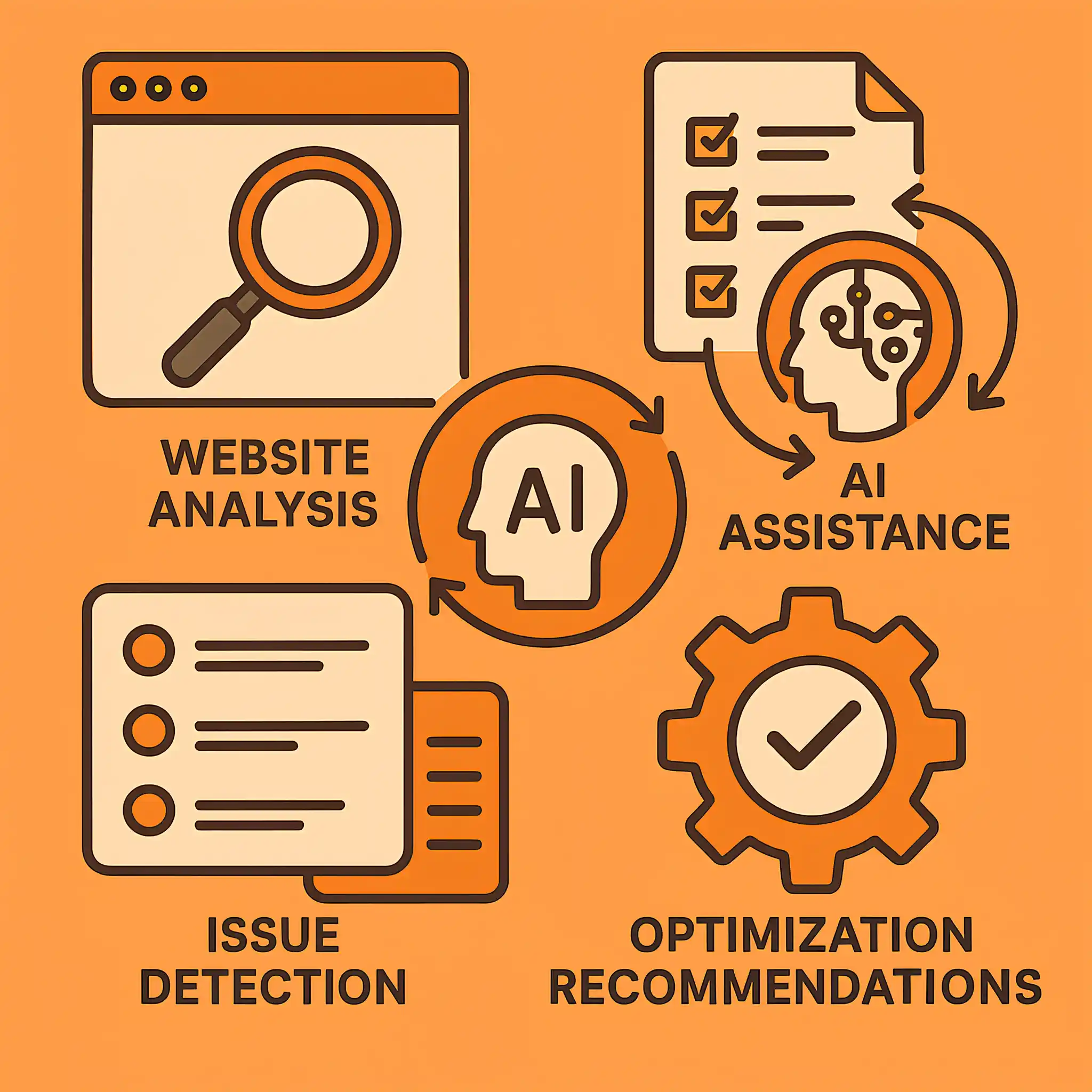
Here’s another real use case: log file analysis. These files are huge, messy, and not very human-friendly. Instead of reading them line by line, I can upload them into a notebook or use Python in ChatGPT to parse the crawl frequency by URL segment.
I can then visualize which sections Googlebot is wasting time on. This kind of analysis used to be reserved for engineers; now I can do it in minutes with AI support.
Even for things like redirect chain detection, you can export all 3xx chains from Screaming Frog, drop them into AI, and ask it to map out redirect hops and suggest which ones can be consolidated.
If you’re looking for AI SEO services, this is one of the things that’s definitely worth adding to your checklist. Your SEO agency can use AI to help with content gap analysis and topic discovery. They can combine various tools with actual SEO data.
For example, for quick idea generation, SEO agencies can use ChatGPT to expand topic clusters or explore question-based content ideas around a primary keyword.
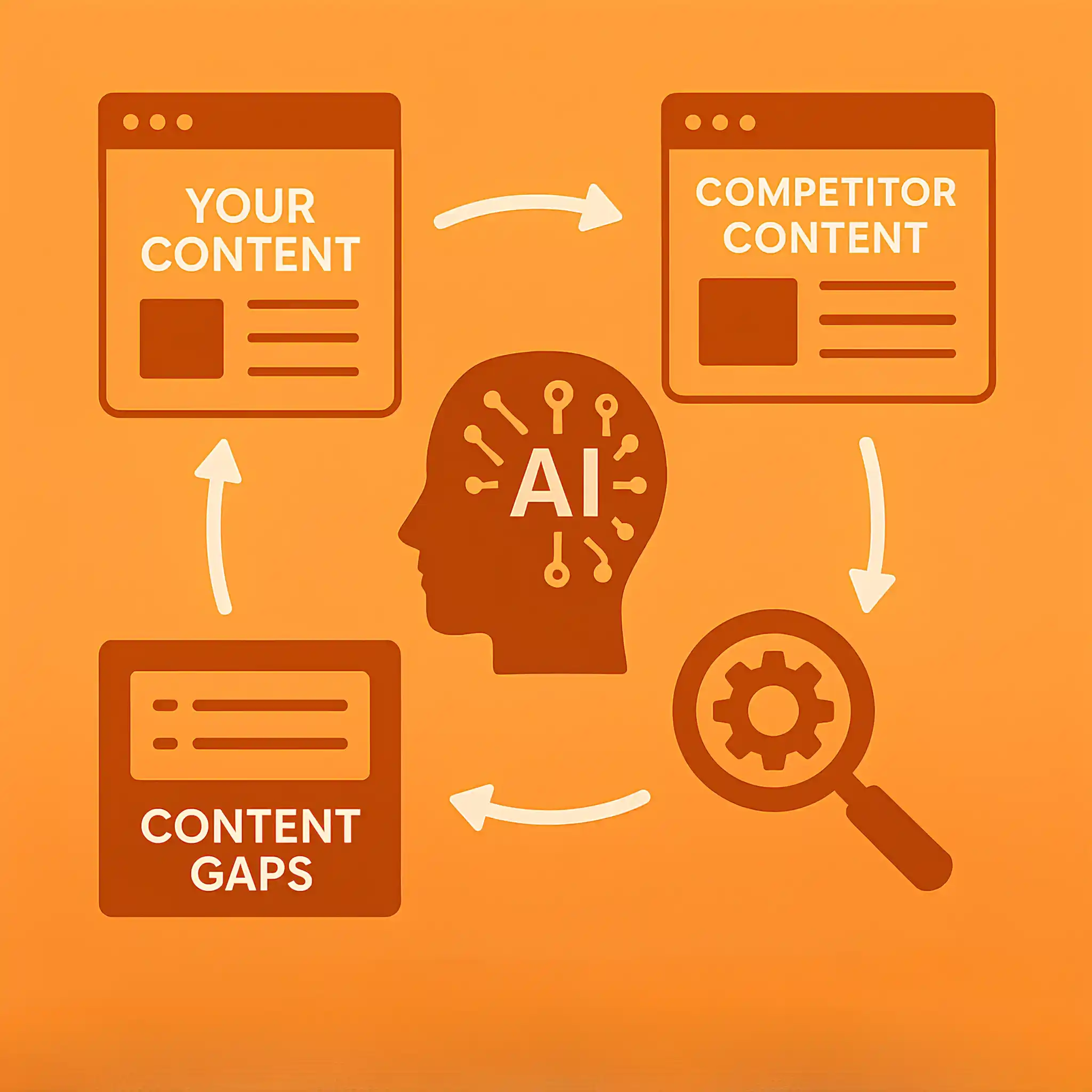
If you’re just using AI like ChatGPT without any SEO tools, expect maybe 60–70% useful ideas; the rest will be either too broad, too similar to what you already have, or totally off-topic.
Advanced tip: You can also use AI to reverse-engineer the structure of competitor content. Copy-paste a top-ranking article into ChatGPT and ask it to break down the sections, tone, CTA placement, and keyword use.
AI can also support competitor and SERP analysis, but if an SEO agency is relying on it 100%, that’s a red flag. For example, AI can quickly analyze headline structures, compare meta titles, spot repeated content patterns, and break down how many listicles or videos are ranking.
It’s great for organizing basic-level data. However, AI can’t recognize brand strength in the SERP, it doesn’t understand why Google might prioritize Reddit or Quora over long-form content, and it doesn’t rely on signals like trust, tone, or E-E-A-T elements.
So yes, agencies can use AI in this process. But, if you’re looking beyond ChatGPT and other LLMs for competitor and SERP analysis, make sure your SEO agency has other effective tools too.
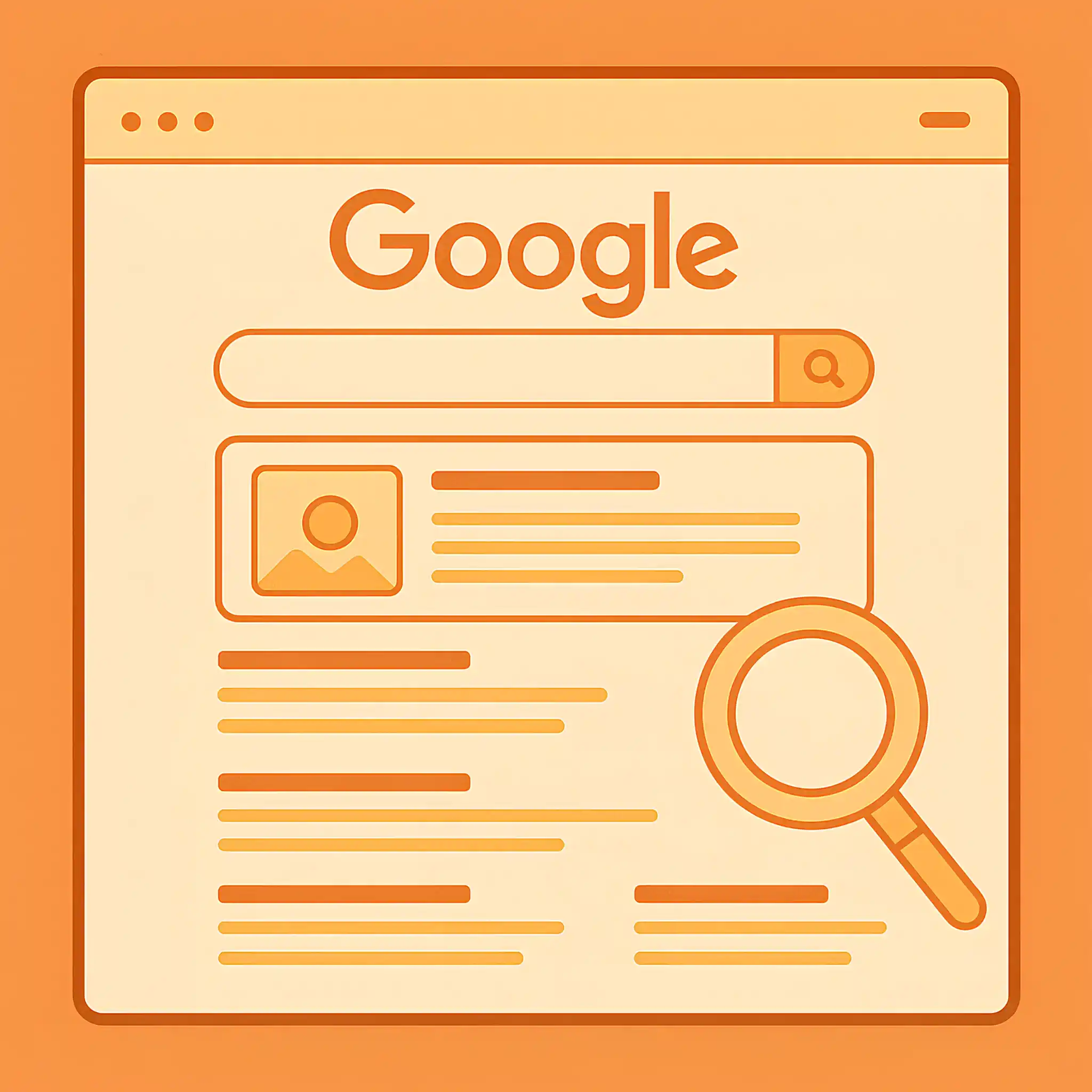
For instance, with Ahrefs’s “ AI Content Helper, “ you can input any top-ranking page from the SERP or Content Explorer, and the AI will summarize the content.
This is useful if you want to:
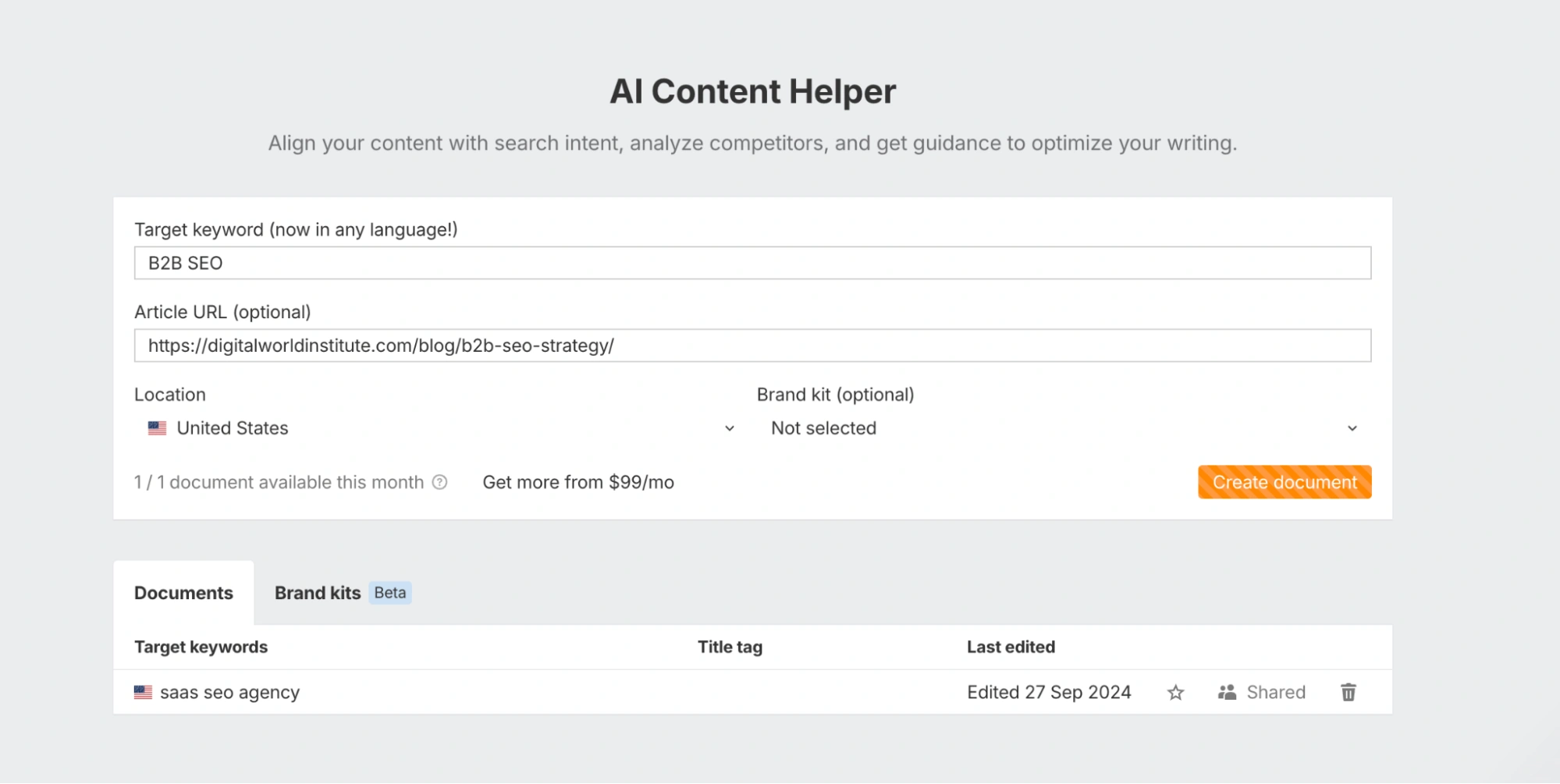
Better than Surfer SEO, but again, in my opinion, it can not replace manual review yet.
We’ve experimented with all kinds of forecasting models, from using tools like Grok to predict content performance to building in-house setups with Google Sheets, ChatGPT, and raw data taken from Search Console, Ahrefs, or Analytics.
We’ve even tested tools like SEOwind and BrightEdge, which offer AI-powered projections for traffic and keyword growth. However, forecasting SEO results today isn’t what it used to be.
Google’s AI Overviews, Gemini, and other LLMs are changing the game every minute, and today it’s really hard to forecast anything. We can spot patterns, we can set expectations, but we can’t promise anything.
In terms of accuracy, if you’re working with clean historical data and a stable niche, you can get around 30–40% directional accuracy over a 3–6 month period. But the further you try to forecast (especially in fast-moving spaces like health, AI, or news), the less useful that number becomes.
A few best practices:
If you’re planning to scale your SEO efforts, especially across hundreds or even thousands of pages, you can’t rely on doing everything manually. Whether you’re an in-house marketer, an agency, or a founder trying to grow fast, this is where hiring an AI-powered SEO service provider makes sense, not to replace the strategy, but to speed up execution at scale without sacrificing quality.
Here is what you can automate with AI (At a glance)
If you’re using WordPress, there are AI-based plugins like Link Whisper that automatically suggest internal link opportunities as you write or even bulk-add them across existing pages. This is a huge time-saver if you’re working with 100+ blog posts or service pages and want to improve crawlability, distribute link equity, or simply feed forgotten pages.
Ahrefs also has a similar feature (AI-based), but in 70% of cases, it’s not accurate
My advice? Review the auto-suggestions manually, even with smart tools, you’ll still get some irrelevant anchor text pairings or links pointing to outdated pages.
Planning content across multiple funnels, products, or buyer journeys is a full-time job in itself. But you can speed it up with tools like:
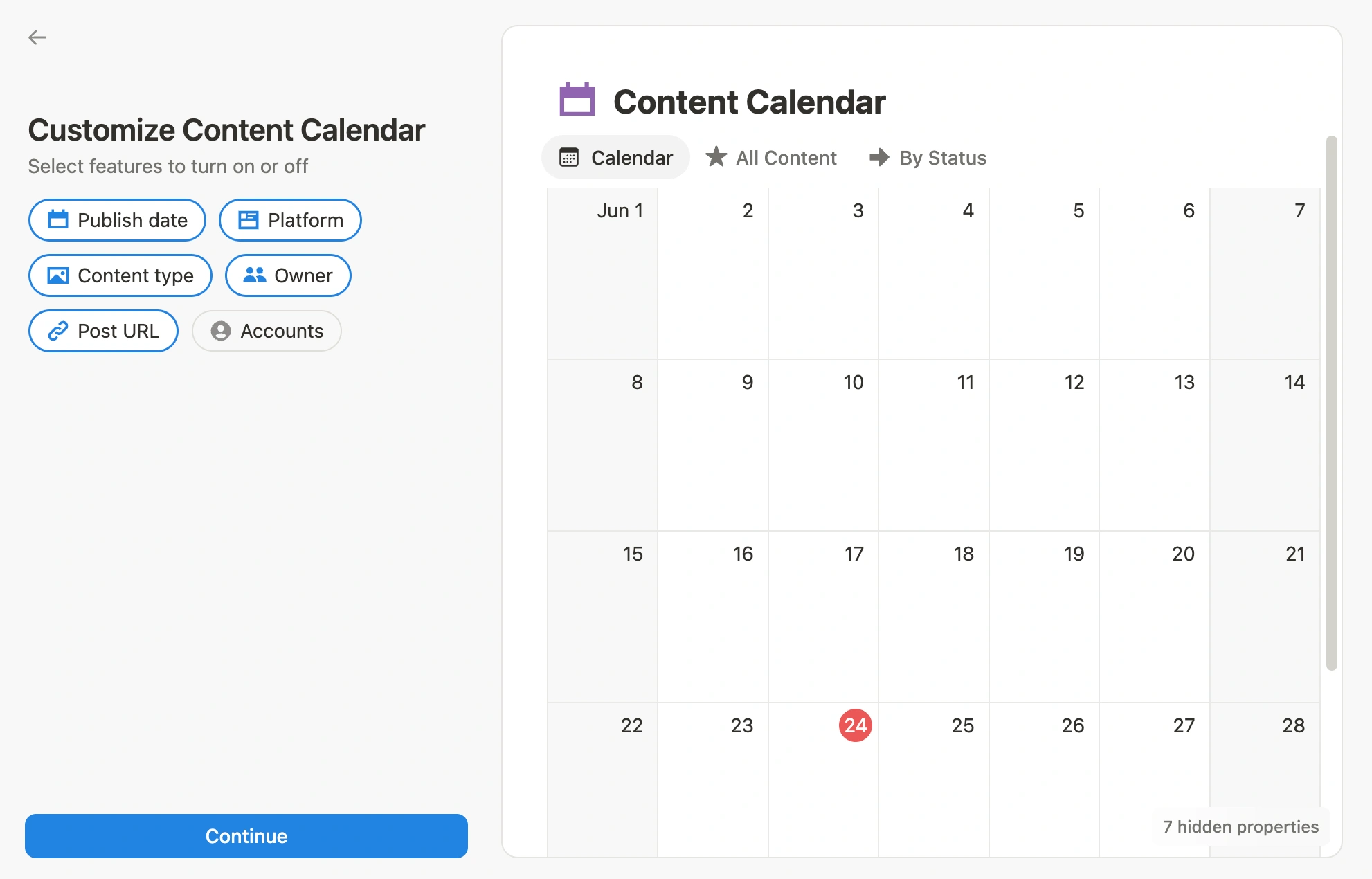
These tools help you map out a 3- to 6-month calendar in days instead of weeks. You feed in seed keywords, topics, or competitor URLs, and the AI returns a prioritized list of pages based on ranking potential, content gaps, and even funnel stages.
Still, don’t blindly follow the calendar. Use it as a draft, then adjust based on your resources, seasonality, and business goals. These AI tools are about 70–75% accurate when it comes to choosing the right topics, but you’ll need to step in to make sure the why behind each piece matches your customer journey.
If you want to scale content across location pages, product variations, or comparison templates, that’s programmatic SEO. This is where AI meets structured data. You don’t write each page manually; you build a content engine.
Tools like:
can help you auto-generate thousands of pages that still follow SEO best practices.
Let’s say you run a travel affiliate site. You can auto-generate “Best Cafes in [City]” for hundreds of cities using a mix of user-generated reviews, city data, and templated GPT-written content. As long as it’s reviewed, de-duplicated, and structured well, this works.
(If you want to go deeper into this, I’ve written a separate [Programmatic SEO Guide] that covers this in full detail.)
Accuracy and performance here vary a lot. It depends on your data quality, your templates, and how much human oversight you apply. With solid checks, you can get 60–80% of these pages ranking or bringing traffic if the niche isn’t hyper-competitive.
If you’re managing a large team of SEO writers, in-house, freelance, or agency-side, writing individual briefs becomes a bottleneck real fast. That’s where AI agents (powered by GPT or Writersonic) can work. You can build a brief-generation workflow where you:
You can generate dozens of briefs a day this way. It doesn’t replace an SEO strategist; it helps them. You still need to QA the output, but once your prompt is solid, you can hit 85–90% consistency in brief quality.
Pro tip: Create a “brief QA checklist” so your editor can quickly scan for logic gaps or keyword stuffing before sending it to writers.
If you’re looking for affordable SEO services, I’ve gotta be honest; so far, I haven’t found any reliable way to optimize content using NLP tools.
Tools such as Surfer SEO, Frase, MarketMuse, or Clearscope provide fake direction.
For example, SurferSEO uses a correlation-based model, not judgment or editorial insight. It looks at the top-ranking pages for your keyword, calculates the average word count, and then gives you a “safe range” based on those numbers.
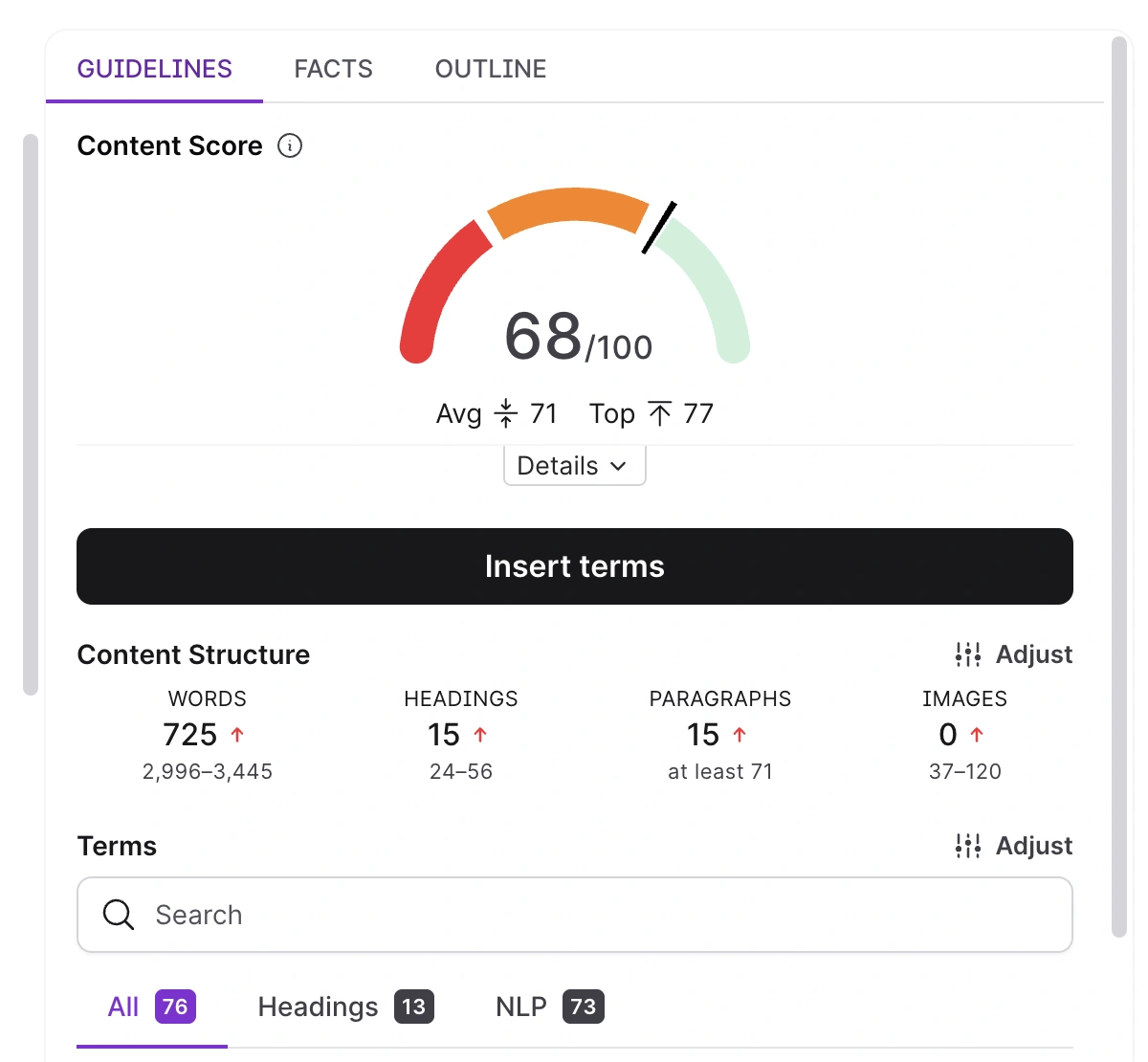
In terms of accuracy, NLP tools are generally 25–30% helpful if you use them for content optimization.
Sometimes it’ll tell you to use a term 14 times just because that’s what a top page did. That doesn’t mean you should do it too. The best results come when you use these tools to guide your structure, not to override common sense.
Instead, you can upload your ready article (in Google Docs format) to GPT and ask it to suggest what kind of FAQs are missing, where there’s a lack of depth, and things like that.
Otherwise, trust your writing, research, and on-page fundamentals more than a keyword density meter.
If you’re planning to outsource SEO, especially the link-building side, keep in mind that not all agencies using “AI for link building” are doing it right. Most can’t even tell the difference between automating smart tasks like link-building outreach and research, and flat-out using bots to drop spammy links on forums, expired domains, or fake PBNs.
What You Should Never Automate:
If an agency promises to get “instant links” or send “50 outreach emails in one click,” that’s a red flag. Those links are either bullshit or temporary, and they usually come with zero context or relationship building.
For example, our team uses the following smart tool combinations for AI-assisted link building:
Always avoid hiring an AI-based link-building agency if there is no human review process, and all links are from the same types of sites.
No, and I don’t think it ever should. AI can absolutely help with parts of the SEO audit process. It can crawl pages, find broken links, flag missing meta tags, spot duplicate content, and even summarize large data sets in seconds.
However, there’s a big difference between identifying issues and understanding what matters. For example, Ahrefs (or SEMrush) always shows a lot of issues, but most of them are useless.
That’s why if you’re serious about performance, you still need a human involved, someone who can look at the big picture, ask the right questions, and make decisions based on context, not just errors.
Even if you’re not ready to hire a full-time SEO team, consider working with a fractional SEO consultant or a dedicated SEO audit company. They can give you that expert perspective, backed by AI tools, sure, but grounded in real strategy and experience.
Not always, and honestly, in many cases, they completely miss the point. I believe most of you don’t care about a 10-page AI-generated SEO report packed with hundreds of metrics, graphs, and jargon.
You care about results; What did we improve? Are we getting more leads? What’s the plan moving forward? Too often, AI reports dump data without explaining what it means or why it matters.
I’ve found that for many clients, a simple 10-minute call is more valuable than any automated report. They want someone to walk them through what moved the needle, what didn’t work, and what we’re going to try next.
I’ve tested a lot of AI tools and browser extensions that claim to analyze search intent, from GPT-powered classifiers to SERP analysis plugins, and I’ll say this: they’ve gotten better, but they’re still not perfect.
The average accuracy rate I’ve seen is around 70%. That means for every 10 keywords, AI gets 3 of them wrong, and when you’re planning a content strategy or building landing pages, 3 wrong calls can waste a lot of time and SEO budget.
For example, AI can usually spot whether something is informational, commercial, or navigational, but it still struggles with mixed-intent queries, local search variations, or keywords with shifting SERPs. It doesn’t always notice when Google is testing new formats, like replacing articles with Reddit threads or prioritizing video carousels.
So, I think AI is great for giving you a quick idea, but it doesn’t beat manual review.
AI SEO platforms are great at tracking KPIs that involve patterns, trends, and large data comparisons over time; the kind of stuff that would take a human hours to piece together manually.
Remember, AI doesn’t always know what’s important to your business. It can track 100 KPIs, but only 5 of them might matter for growth. So yes, AI platforms are incredibly helpful for tracking SEO KPIs; just make sure you’re asking the right questions before trusting the insights blindly.
Not really. At least, not yet. GA4 is still the most reliable platform when it comes to raw user behavior data: page views, scroll depth, session duration, events, conversions, device types; it’s all there, and it’s coming directly from your site.
The problem is, GA4 isn’t exactly user-friendly. Most business owners don’t want to spend an hour figuring out why the bounce rate disappeared or where conversions are being tracked now.
AI helps make sense of it faster. Some AI tools can summarize trends, highlight drop-offs, or predict churn based on behavioral patterns. So no, AI isn’t better at collecting data, but it can be better at explaining what’s going on if you’re not deep in analytics all day.
Yes! AI tools can absolutely help detect keyword cannibalization, but only if you give them the right data. One simple and effective way is to export all your pages and their ranking keywords from Google Search Console, drop that into a Google Sheets document, and then let GPT or another AI assistant analyze it.
From there, the AI can scan for cases where multiple URLs are ranking for the same or very similar keywords. It’ll highlight overlaps and flag pages that might be competing against each other.